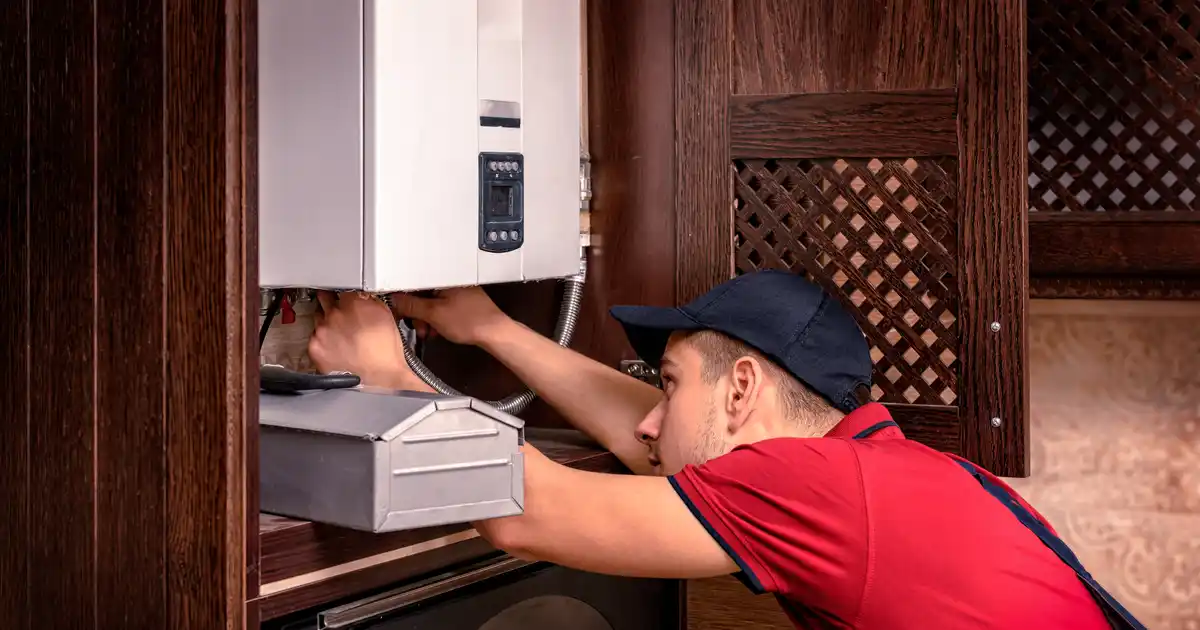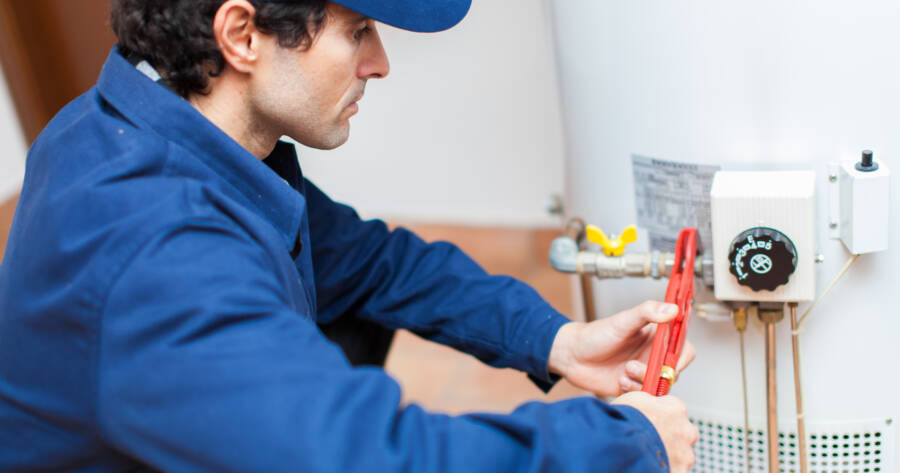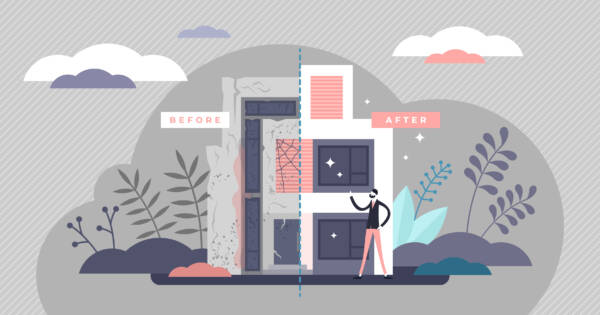- Your water heater provides your home with hot water for cooking, cleaning, or bathing.
- Water heaters (or hot water tanks) don’t last forever. Eventually, repair or replacement will be required.
- The average costs to repair or replace a hot water varies widely, depending on the size and type of the unit.
If you’re reading this, you’ve probably noticed that something isn’t quite right with your water heater lately. After all, you probably don’t pay much attention to it on a daily basis. Still, you should see (or hear) your water heater running a few times a week. If it’s not, you should do an online search to learn more about the most common water heater problems.
If your water heater isn’t running when it should be (or you just suddenly don’t have hot water at all), then you have an issue. It might be something small, like the thermostat or the pilot light. However, it could also be something more serious, like rust or scale build-up inside of the tank itself. If you suspect something is wrong with your water heater, search online for qualified local professionals who can repair or replace your unit.
What Does a Water Heater Do?
Water heaters are a big part of most homes. They provide hot water for bathing, cooking, cleaning, and other activities that require warm water. A water heater tank is basically a storage container designed to maintain a temperature of at least 160 degrees Fahrenheit. It can hold anywhere from 10 to 80 gallons of water. On average, homeowners spend about $0.20 per gallon per month to keep their heater running. If you have a large family or live in a home with many occupants, your cost will likely be higher.
If you don’t have a tank, you likely have a “tankless” or “on-demand” water heater system. Rather than a ready supply of hot water in a large tank, these systems heat water rapidly whenever you turn on a hot water tap in the house.
Common Problems and Issues With Water Heaters
Sometimes, your water heater will be working just fine one day and then suddenly cease to function properly. It could be a small electrical malfunction or a bigger problem. It’s often difficult to identify these issues yourself, so you call an expert. In many cases, you might not even notice that there’s an issue until your hot water tank suddenly stops heating up water at all. Worst case scenario is that your lank leaks and floods the surrounding area of your house.
The most common issues are actually quite easy to spot if you know what to look for. They are things like a burnt out pilot light or accidently becoming unplugged. While fixing a water heater can be intimidating, especially if you don’t have any experience with plumbing work, it’s important to remember that almost every issue is fixable without major renovations. If you run into trouble trying to diagnose and repair your own unit, call in a professional plumber who can walk you through some possible solutions.
Average Water Heater Repair Costs
The average water heater repair cost will vary depending on where you live, how old your heater is, and whether you have covered it under a warranty. For example, if you have just purchased your heater and signed up for an extended warranty, it might cover your labor costs in addition to any parts that need replacing.
However, if your water heater is older than ten years and no longer covered by a warranty, labor costs can easily exceed $300. On top of that, certain parts may be hard to find at affordable prices — especially if your model has been discontinued by its manufacturer. If your water heater has begun leaking due to faulty seals or gaskets, fixing these issues can cost upwards of $500–$1,000.
Here are some other common repairs, and their average costs:
- Pilot Light Reignition – $50 to $150.
- Thermocouple Replacement – up to $200.
- New Thermostat – up to $250.
- New heating element – Between $200 and $500.
- Leaking – At least $500 to $1,000, up to the cost of a total replacement (depending how bad the leak it).
Tankless or Standard Water Heater?
One of your first decisions when buying (re placing) a water heater is whether to purchase a tankless or standard one. Tankless water heaters use energy more efficiently than their tank-based counterparts, because they heat up water as you need it rather than storing hot water ahead of time.
However, installation can be costly and there are some downsides to using them. On average, you can expect to pay $1,200 for a new tankless water heater in addition to $500 to $2,000 for installation costs. This means that total costs will range from $1,500-$3,500 — not including repair and maintenance costs. Replacing a standard water heater is slightly less, at around $1,700 on average.
The Cost of DIY Tankless Installation
If you’re interested in tankless water heaters, you’ll find that it’s possible to save quite a bit of money when you do your own installation. That said, it’s not an easy or straightforward process. There are many factors that can affect how much it costs—including things like your experience with home improvement projects. A tankless water heater can cost up to $3,500 to have professionally installed.
As with any DIY project, make sure you do thorough research before you start. Consult professionals for advice before taking on a tankless installation on your own. The cost will vary depending on where you live and what type of system you choose. The average DIY cost is around $1,300, for the tank itself and needed parts or tools.
Common Problems with Tankless Water Heaters
Tankless water heaters are generally easier to install than traditional tank models. However, it’s a good idea to check the upfront costs if you’re on a tight budget. In addition to installation costs, tankless water heaters have maintenance issues that can crop up over time and cost an arm and a leg in repairs or replacements.
While these water heaters are generally more efficient than traditional models, they may not be worth their higher price tag if they break down regularly. One common problem with tankless water heaters is that mineral deposits build up in pipes, making them difficult to clean out. This can increase energy consumption while decreasing overall efficiency.
The Bottom Line
There’s really no such thing as a “typical” water heater repair cost. The labor, parts, and locations of water heaters vary by home and by job. The best way to get an idea of what you might pay is to schedule an appointment with a professional in your area. Once there, you can ask for an estimate based on the diagnostics and troubleshooting that is performed during your visit.
 Shutterstock
Shutterstock







